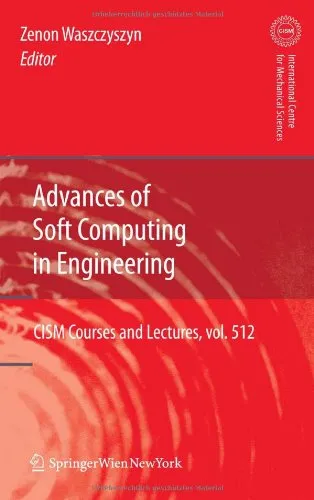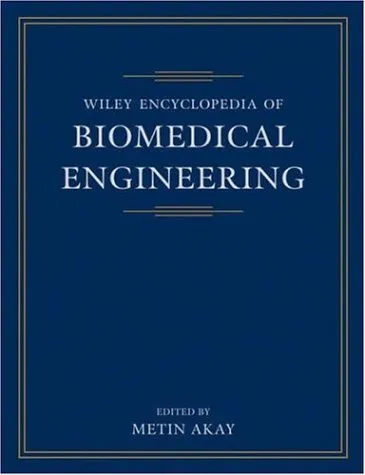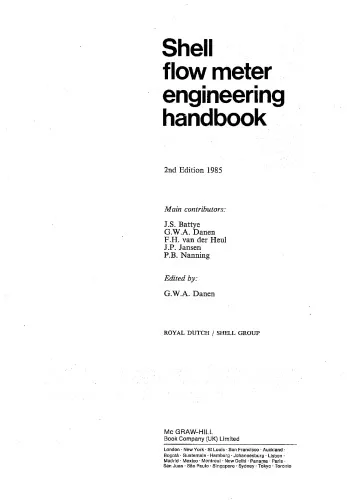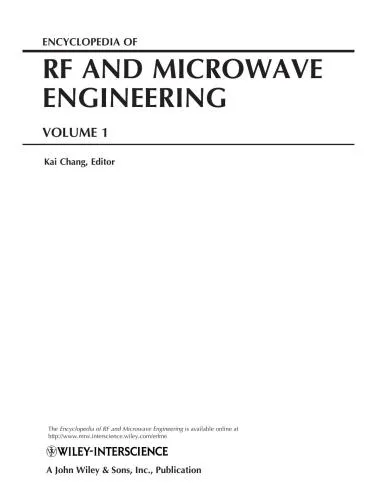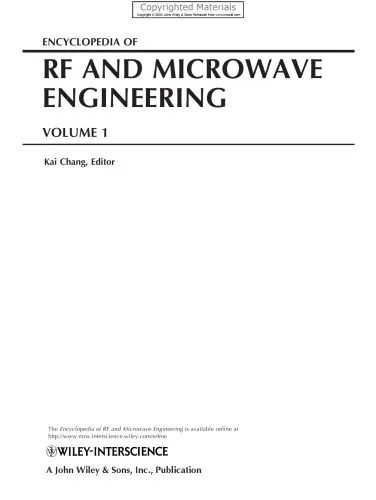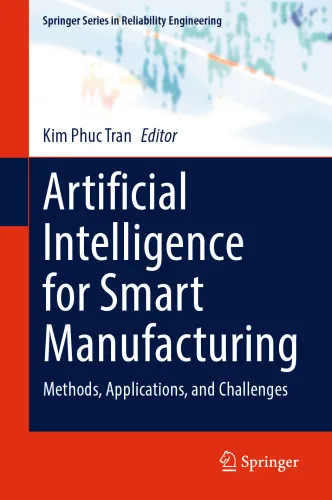Advances of Soft Computing in Engineering (CISM International Centre for Mechanical Sciences, 512)
4.5
بر اساس نظر کاربران

شما میتونید سوالاتتون در باره کتاب رو از هوش مصنوعیش بعد از ورود بپرسید
هر دانلود یا پرسش از هوش مصنوعی 2 امتیاز لازم دارد، برای بدست آوردن امتیاز رایگان، به صفحه ی راهنمای امتیازات سر بزنید و یک سری کار ارزشمند انجام بدینکتاب های مرتبط:
شناخت مختصر از کتاب 'Advances of Soft Computing in Engineering (CISM International Centre for Mechanical Sciences, 512)'
کتاب 'Advances of Soft Computing in Engineering' یکی از آثار مهم در حوزه Soft Computing است که توسط زنون واشچیشین نوشته شده و تمرکز آن بر کاربردهای بسیار پیشرفته این تکنیکها در مهندسی است. این کتاب توسط مرکز بینالمللی علوم مکانیکی (CISM) منتشر شده و شماره 512 در این سری از کتابها است. با تمرکز بر تکنیکهای پیشرفته مانند Neural Networks، Fuzzy Logic، Genetic Algorithms، و دیگر روشهای Soft Computing، این کتاب برای توسعه کاربردهای عملی در مهندسی بسیار ایدهآل است.
خلاصه مفصل کتاب
این کتاب به بررسی تئوری و کاربردهای عملی Soft Computing در زمینههای مختلف مهندسی میپردازد. مطالبی که در این کتاب مورد بحث قرار گرفته است، شامل اصول و مبانی Soft Computing و روشهای تطبیق آن با نیازهای مهندسی مدرن است. نویسنده تلاش کرده است مفاهیم پیچیده را با شرح دقیق و مثالهای کاربردی ارائه دهد تا برای دانشجویان، محققان، و مهندسان قابل استفاده باشد. این کتاب به شیوهای از روابط میان الگوریتمهای هوش مصنوعی و مدلهای ریاضی پرداخته و نحوه به کارگیری آنها را در حل مسائل مهندسی واقعی شرح داده است.
نکات کلیدی
- ارائه دیدگاههایی جدید در استفاده از Soft Computing در مهندسی.
- بررسی انواع تکنیکهای جدید از جمله Evolutionary Computation و Machine Learning.
- تشریح کاربردهای عملی مانند تحلیل سازهها و بهینهسازی طراحی.
- ارتباط بین Soft Computing و Computational Mechanics برای حل مسائل پیچیده.
- نمونههای واقعی از پیادهسازی در پروژههای مهندسی.
جملات معروف از کتاب
"The future of engineering lies in harnessing the power of interdisciplinary approaches, with Soft Computing at its core."
"By bridging the gap between computational precision and human intuition, Soft Computing opens new horizons in problem-solving."
چرا این کتاب مهم است؟
این کتاب، یکی از آثار پیشتاز در زمینه ترکیب هوش مصنوعی و مهندسی است. با معرفی روشهای نوین Soft Computing، این کتاب به متخصصان کمک میکند تا به صورت مؤثر و کارآمدتر مسائل پیچیده را حل کنند. روشهایی که در این کتاب معرفی شدهاند، نه تنها تطبیقپذیری بالایی دارند بلکه برای حل چالشهای مدرن در سازهها، مکانیک، و بهینهسازی بسیار مفید هستند. همچنین این کتاب با متمرکز شدن بر کاربردهای عملی به عنوان یک منبع آموزشی ارزشمند برای محققان و دانشجویان مطرح است.
Welcome to the introduction of "Advances of Soft Computing in Engineering", a cornerstone publication in the field of computational mechanics and engineering sciences. Authored by Zenon Waszczyszyn, this volume is part of the renowned CISM (International Centre for Mechanical Sciences) series, specifically listed as volume 512. This book delves deeply into the rapidly growing field of soft computing, exploring its potential to transform traditional engineering methodologies.
Detailed Summary of the Book
The book "Advances of Soft Computing in Engineering" is a comprehensive guide to harnessing the power of soft computing techniques, such as artificial neural networks, fuzzy logic, genetic algorithms, and other biologically inspired computational models, to solve complex engineering problems. Rigid mathematical frameworks have dominated classical engineering for decades; however, these frameworks often fall short when tackling nonlinear, ambiguous, or uncertain problem domains.
This volume introduces a paradigm shift by emphasizing the application of soft computing to areas like structural mechanics, optimization, material science, and fluid dynamics. With step-by-step explanations, the book showcases how these techniques can provide flexible, adaptive, and robust solutions for forecasting and decision-making in engineering systems. Each chapter presents real-world examples and case studies, allowing readers to see the impact of soft computing on fields like risk assessment, design optimization, and fault detection.
Key Takeaways
Readers of "Advances of Soft Computing in Engineering" will gain invaluable insights into the following:
- Understanding the fundamental principles of soft computing and why it is becoming a viable alternative to traditional numerical methods.
- Learning about the integration of artificial intelligence methods in solving non-linear and multi-objective optimization problems.
- Enhancing knowledge on hybrid techniques that combine genetic algorithms, fuzzy systems, and neural networks for advanced engineering applications.
- Exploring the pragmatic use of soft computing in predictive modeling, material behavior analysis, and simulation scenarios.
- Gaining access to real-world examples and computational results that illustrate the success of soft computing methodologies.
Famous Quotes from the Book
"Soft computing is not about replacing rigorous analytical methods but about complementing them with techniques that embrace uncertainty, adaptability, and human intuition."
"The art of engineering lies in solving problems that are not only technically correct but also practically applicable. Soft computing takes us closer to this goal."
"In a world defined by constant evolution, the ability to adapt computational models to uncertain, dynamic environments is paramount."
Why This Book Matters
Soft computing has emerged as a revolutionary field in recent years. Traditional approaches often rely solely on deterministic models, assuming strict rules and well-defined systems. While these methods provide reliable outputs in stable environments, they falter in dealing with the uncertainty and complexity of real-world applications. This book is essential because it bridges the gap between theoretical advances in soft computing and their practical applications in engineering sciences.
Engineering professionals, academics, and students alike will find this volume invaluable in understanding the interplay between computational models and human-inspired heuristics. It serves as both a primer for those new to the field and an advanced resource for seasoned practitioners seeking to apply these methods in innovative ways. The multidisciplinary approach ensures that its audience spans mechanical, aeronautical, civil, and other branches of the engineering sciences.
Moreover, its inclusion in the prestigious CISM series highlights the book's credibility and relevance. As industries worldwide move toward automation and intelligent systems, soft computing methods provide scalable solutions to contemporary challenges such as sustainability, resource optimization, and safety-critical engineering systems.
In conclusion, "Advances of Soft Computing in Engineering" not only educates readers about the tools and techniques of soft computing but also inspires them to think innovatively about its applications in engineering. It is a must-read for anyone aspiring to stay ahead in the rapidly evolving landscape of computational sciences.
دانلود رایگان مستقیم
شما میتونید سوالاتتون در باره کتاب رو از هوش مصنوعیش بعد از ورود بپرسید
دسترسی به کتابها از طریق پلتفرمهای قانونی و کتابخانههای عمومی نه تنها از حقوق نویسندگان و ناشران حمایت میکند، بلکه به پایداری فرهنگ کتابخوانی نیز کمک میرساند. پیش از دانلود، لحظهای به بررسی این گزینهها فکر کنید.
این کتاب رو در پلتفرم های دیگه ببینید
WorldCat به شما کمک میکنه تا کتاب ها رو در کتابخانه های سراسر دنیا پیدا کنید
امتیازها، نظرات تخصصی و صحبت ها درباره کتاب را در Goodreads ببینید
کتابهای کمیاب یا دست دوم را در AbeBooks پیدا کنید و بخرید
1127
بازدید4.5
امتیاز0
نظر98%
رضایتنظرات:
4.5
بر اساس 0 نظر کاربران
Questions & Answers
Ask questions about this book or help others by answering
No questions yet. Be the first to ask!
